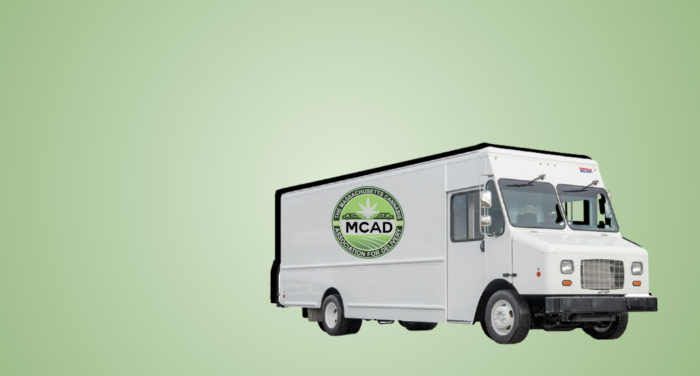
The handwriting on the wall was clear, COVID had changed buying habits, and more consumers were opting for home delivery—and that behavior would easily translate to cannabis
Marijuana home delivery has been a hot topic in Massachusetts since May and will likely remain in the news for some time. This controversial new license class has been under attack and the hits on home delivery will also continue. To properly understand the current state of marijuana home delivery in Massachusetts requires a hard look at the controversies. In this multi-part series, we explore what’s going on and how it might impact the various groups who have a dog in this fight.
The impact of COVID-19 and the uncertainty over the licensing led many prospective operators to a long anxious summer. Rumors abound about regulatory changes. Several disparate and informal groups began to organize to discuss the delivery dilemma.
Chris Fevry, a delivery applicant, realized the many voices weren’t unified, and needed knowledge and resources. Chris responded by organizing the Massachusetts Cannabis Association for Delivery (MCAD). Assisted by Aaron Goines, a former Wall Street derivatives trader, Janelle Goines, a former Big-6 accountant, Devin Alexander, and Morriss Partee, MCAD became one of the more compelling voices in the industry. Janelle, Devin, and Morris were all participants in the social equity training program.
MCAD and other advocates met with members of the Cannabis Control Commission to explain that the license-model economics would not be profitable, and would likely lead to many home-delivery agents going out of business within one year. The commissioners dug into the issue and reached a similar conclusion.
The proposed solution was to split home delivery licensees into two distinct classes: one would act as a courier for retail stores, and the other would be allowed to purchase and stock marijuana products from licensed cultivators and product manufacturers, accept online orders directly from consumers, fulfill, and deliver those orders.
Numerous restrictions were imposed upon both home delivery license types including that all drivers must be employees of the licensees and all delivery vehicles must be owned or leased by the delivery operator. Vehicles must be unmarked, outfitted with additional security features, delivery staff cannot carry firearms, and the delivery team must check in with dispatch at least every 30 minutes.
On Aug. 28, the CCC held a regulatory review session, and at its Sept. 10 meeting delved further into the home-delivery regulations. On Sept. 24, the commission approved draft regulations for delivery. With rumors circulating that the Commonwealth Dispensary Association (CDA), an association made up of the largest and oldest vertically-integrated operators, planned to sue the CCC to stop the licenses, the commission opened a fresh public comment period that closed Oct. 15.
The CDA and the Massachusetts Municipal Association opposed the changes, but on Oct. 20, the commission “approved additional policy changes to its draft regulations that establish two Marijuana Establishment types authorized to provide limited delivery services to adult-use cannabis consumers in the Commonwealth. A final vote on all modifications to Massachusetts’ adult and medical use of marijuana regulations will occur at a subsequent public meeting slated for October 29.”
The CDA became more vocal about its plans to sue, arguing that there were not sufficient public comment opportunities and the process was being rushed (despite home delivery having been in the works for three plus years). What the CDA missed is that regulatory agencies have to hold public comment periods, but there is absolutely no obligation that they do what the commenters request and a review of those comments is legally sufficient to satisfy their administrative process obligations under the law.
COVID had changed the world, and more customers were opting for curbside pickup of cannabis. In mid-August, the US Census reported that “Ecommerce sales in the second quarter of 2020 accounted for 16.1 percent of total sales,” and had increased by 31.9% for the first quarter of 2020.
The handwriting on the wall was clear, COVID had changed buying habits, and more consumers were opting for home delivery—and that behavior would easily translate to cannabis. Unlicensed sellers had transformed from selling joints on a street corner to using Instagram, other social media platforms, and creating web sites, all driven with home delivery. Home delivery adoption would likely be robust and quick and the CDA’s members would feel the squeeze at their brick and mortar locations. One could easily envision a scenario where home delivery captures 30% of the regulated adult-use marijuana market. Consider that at present, numerous unregulated home delivery operators service thousands of customers. Home delivery might bring more of these consumers into the regulated (and taxed) adult-use market, bypassing brick and mortar operators.
To respond to the CDA’s threats, the CCC postponed the Oct. 29 planned vote and instead elected to open another public comment session for Nov. 13, 2020, with a vote on Nov. 30. A few days prior to the public comment session, the commission released all written comments it had received (this was a first, written comments had generally not been released in the past, but someone might have filed a Public Records Law request).
The comments unmasked those who were opposing home delivery in private but publicly stating they supported social equity. Some personal relationships became quickly strained and several opponents back-tracked, claiming they had received inaccurate information from one of the groups opposing the home delivery regulations. The Nov. 13, 2020 public comment session featured 100 speakers, most overwhelmingly supportive of home delivery. Approximately 20 people on the waitlist were moved up to speaking slots as opponents dropped out.
The commission held a final vote on the regulations and approved them Nov. 30, 2020. Under the final regulations, Social Equity and Economic Empowerment applicants have exclusive rights to these licenses for a period of three years (up from two) and that clock doesn’t start to tick until the first home delivery licensee in each class becomes operational.
While all other license classes are generally capped at three licenses per operator, the home delivery licenses are capped at two. Retail licensees can have up to three stores and up to two home delivery licenses (but cannot apply for a home delivery license for at least three years unless the operator is a Social Equity or Economic Empowerment applicant). The Commission’s press release details the various program changes.


























